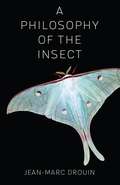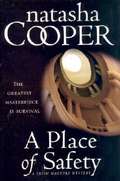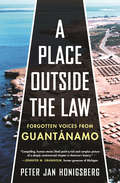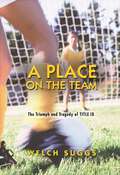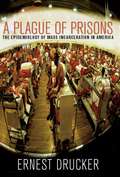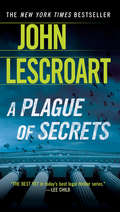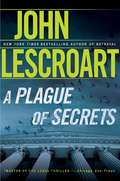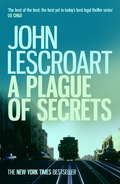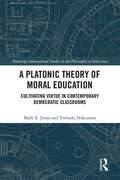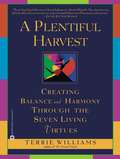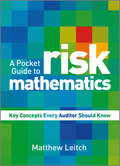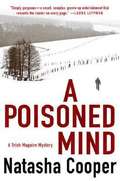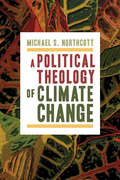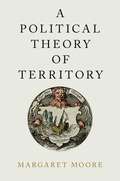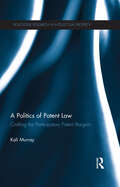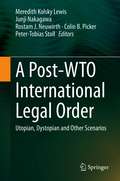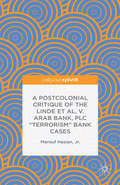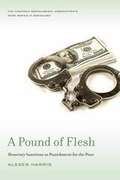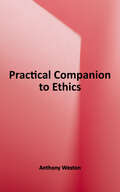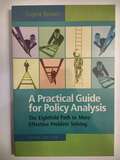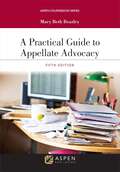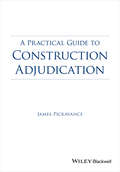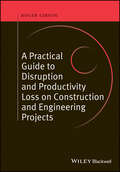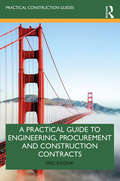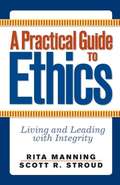- Table View
- List View
A Philosophy of the Insect
by Jean-Marc DrouinThe world of insects is at once beneath our feet and unfathomably alien. Small and innumerable, insects surround and disrupt us even as we scarcely pay them any mind. Insects confront us with the limits of what is imaginable, while at the same time being essential to the everyday functioning of all terrestrial ecosystems.In this book, the philosopher and historian of science Jean-Marc Drouin contends that insects pose a fundamental challenge to philosophy. Exploring the questions of what insects are and what scientific, aesthetic, ethical, and historical relationships they have with humanity, he argues that they force us to reconsider our ideas of the animal and the social. He traces the role that insects have played in language, mythology, literature, entomology, sociobiology, and taxonomy over the centuries. Drouin emphasizes the links between humanistic and scientific approaches—how we have projected human roles onto insects and seen ourselves in insect form. Caught between the animal and plant kingdoms, insects force us to confront and reevaluate our notions of gender, family, society, struggle, the division of labor, social organization, and individual and collective intelligence. A remarkably original and thought-provoking work, A Philosophy of the Insect is an important book for animal studies, environmental ethics, and the history and philosophy of science.
A Place Of Safety
by Natasha CooperBarrister Trish Maguire needs all the time she can find to help her young half-brother adjust to life after the violent death of his mother. Sir Henry Buxford, an influential acquaintance, has other ideas. He asks Trish to investigate one of his private charities, a magnificent art collection built up before 1914 and lost for most of the twentieth century. Taking a crash course in the murkier aspects of the art world, Trish is determined to unlock the secrets she is sure are hidden somewhere in the collection. Her research takes her not only into the heart of an engrossing love story, but also into the agonizing reality of the trenches of the First World War. She soon discovers a web of deceit that has spanned the decades since, catching all kinds of people in its filaments. Now, the innocent, the violent, and the victims all have to free themselves. And someone dies. With her trademark dexterity and hard-hitting suspense, Natasha Cooper brings us the unstoppable Trish Maguire in her most challenging and enthralling case to date.
A Place Outside the Law: Forgotten Voices from Guantanamo
by Peter Jan HonigsbergFirsthand testimonies from Guantánamo Bay, inspiring future generations to never repeat the human rights violations of the detention center.Law scholar and Witness to Guantánamo founder Peter Jan Honigsberg uncovers a haunting portrait of life at the military prison and its toll, not only on the detainees and their loved ones but also on its military and civilian personnel and the journalists who reported on it.Honigsberg conducted 158 interviews across 20 countries so that the people who lived and worked there could tell their heartbreaking and inspirational stories. In each one, we face the reality that the healing process cannot begin until we start the conversation about what was done in the name of protecting our country. These are a few of them. Many alleged operatives in Guantánamo were purchased by the United States for ransom from Afghan and Pakistani soldiers. Brandon Neely, a prison guard who processed the first group of suspected operatives to arrive in Cuba, flew to London to embrace the detainees he guarded after leaving the military. Navy whistleblower Matt Diaz covertly released the names of 500 detainees by sending them in a greeting card to a lawyer in New York. Journalist Carol Rosenberg committed the past 17 years of her career to documenting life at Guantánamo. And Damien Corsetti, an interrogator who came to be known as the "King of Torture," received ribbons and awards for the same cruel actions for which he was later prosecuted. In startling, aching prose, A Place Outside the Law shines a light on these unheard voices, and through them, encourages the global community to embrace humanity as our greatest tool to make the world a safer place.
A Place on the Team: The Triumph and Tragedy of Title IX
by Welch SuggsA Place on the Team is the inside story of how Title IX revolutionized American sports. The federal law guaranteeing women's rights in education, Title IX opened gymnasiums and playing fields to millions of young women previously locked out. Journalist Welch Suggs chronicles both the law's successes and failures-the exciting opportunities for women as well as the commercial and recruiting pressures of modern-day athletics. Enlivened with tales from Suggs's reportage, the book clears up the muddle of interpretation and opinion surrounding Title IX. It provides not only a lucid description of how courts and colleges have read (and misread) the law, but also compelling portraits of the people who made women's sports a vibrant feature of American life. What's more, the book provides the first history of the law's evolution since its passage in 1972. Suggs details thirty years of struggles for equal rights on the playing field. Schools dragged their feet, offering token efforts for women and girls, until the courts made it clear that women had to be treated on par with men. Those decisions set the stage for some of the most celebrated moments in sports, such as the Women's World Cup in soccer and the Women's Final Four in NCAA basketball. Title IX is not without its critics. Wrestlers and other male athletes say colleges have cut their teams to comply with the law, and Suggs tells their stories as well. With the chronicles of Pat Summitt, Anson Dorrance, and others who shaped women's sports, A Place on the Team is a must-read not only for sports buffs but also for parents of every young woman who enters the arena of competitive sports.
A Plague of Prisons: The Epidemiology of Mass Incarceration in America
by Ernest DruckerWhen Dr. John Snow first traced an outbreak of cholera to a water pump in the Soho district of London in 1854, the field of epidemiology was born. Taking the same public health approaches and tools that have successfully tracked epidemics of flu, tuberculosis, and AIDS over the intervening one hundred and fifty years, Ernest Drucker makes the case that our current unprecedented level of imprisonment has become an epidemic-a plague upon our body politic.Drucker, an internationally recognized public health scholar and Soros Justice Fellow, spent twenty years treating drug addiction and another twenty studying AIDS in some of the poorest neighborhoods of the South Bronx and worldwide. Hecompares mass incarceration to other, well-recognized epidemics using basic public health concepts: "prevalence and incidence," "outbreaks," "contagion," "transmission," and "potential years of life lost."He argues that imprisonment-originally conceived as a response to individuals' crimes-has become mass incarceration: a destabilizing force that undermines the families and communities it targets, damaging the very social structures that prevent crime.Sure to provoke debate, this book shifts the paradigm of how we think about punishment by demonstrating that our unprecedented rates of incarceration have the contagious and self-perpetuating features of the plagues of previous centuries.
A Plague of Secrets
by John LescroartIn a multiple murder case plagued by lies and deception, there is one terrible secret that defense attorney Dismas Hardy is duty-bound to protect. Even if the price is his client's life. When Dylan Vogler, the charming manager of the popular Bay Beans West coffee shop in San Francisco's Haight-Ashbury district, is gunned down near the store, inspectors are shocked to discover that his knapsack is overflowing with high-grade marijuana. It soon becomes clear that San Francisco's A-list flocked to Bay Beans West for more than a pricy caffeine fix. Maya Townshend is the absentee owner of the shop--and the beautiful and extremely wealthy socialite niece of the city's mayor. When she becomes Dismas Hardy's client, he thinks it will be a simple hand-holding exercise until the police identify a suspect. But then another of Maya's past acquaintances turns up murdered, and the newspapers begin to reveal the names of the coffee shop's celebrity, political, and even law-enforcement clientele. Hardy begins to question how much his client knew about what was actually going on inside her business--and whether she was also Vogler's lover. All the while Hardy's best friend, homicide lieutenant Abe Glitsky, sick with worry over his severely injured youngest child, barely functions at his job. Without his supervision, his inspectors are prey to the machinations of the many power brokers with interests in the case. Ambitious prosecutors close in on Maya, and as her trial gets under way, Hardy discovers that his client harbors an explosive secret. A secret that Dismas Hardy is privilege-bound to protect. Perceptive, fast-paced, and masterfully plotted, A Plague of Secrets represents John Lescroart working at the absolute top of his game.
A Plague of Secrets (Dismas Hardy #13)
by John LescroartDismas Hardy, Abe Glitsky, and Wyatt Hunt return in a compelling and timely legal thriller filled with blackmail, political intrigue, and multiple murder. The first victim is Dylan Vogler, a charming ex-convict who manages the Bay Beans West coffee shop in San Francisco's Haight-Ashbury district. When his body is found, inspectors discover that his knapsack is filled with high-grade marijuana. It soon becomes clear that San Francisco's A-list flocked to Bay Beans West not only for their caffeine fix. But how much did Maya Townshend-the beautiful socialite niece of the city's mayor, and the absentee owner of the shop-know about what was going on inside her business? And how intimate had she really been with Dylan, her old college friend? As another of Maya's acquaintances falls victim to murder, and as the names of the dead men's celebrity, political, and even law- enforcement customers come to light, tabloid-fueled controversy takes the investigation into the realms of conspiracy and cover-up. Prosecutors close in on Maya, who has a deep secret of her own-a secret she needs to protect at all costs during her very public trial, where not only her future but the entire political landscape of San Francisco hangs in the balance, hostage to an explosive secret that Dismas Hardy is privilege-bound to protect.
A Plague of Secrets: A gripping legal thriller with shocking twists (Dismas Hardy #No. 13)
by John LescroartA drug-based multiple-murder investigation has some shocking revelations in the page-turning thirteenth thriller in the Dismas Hardy series. A Plague of Secrets by the critically acclaimed John Lescroart is perfect for fans of J.J. Miller and Michael Connelly.'The best of the best: the best yet in today's best legal thriller series' - Lee ChildWhen Dylan Vogler, the manager of the Bay Beans West coffee shop, is murdered, inspectors discover that his knapsack is filled with high-grade marijuana. It soon becomes clear that San Francisco's A-list flocked to Bay Beans West not only for their caffeine fix. But how much did Maya Townshend - the socialite niece of the city's mayor, and the owner of the shop - know about what was going on inside her business? As another of Maya's acquaintances is murdered, and as the names of the celebrity, political, and even law-enforcement customers come to light, tabloid-fuelled controversy takes the investigation into the realms of conspiracy and cover-up. Prosecutors close in on Maya, who has a deep secret of her own - a secret she needs to protect at all costs during her very public trial, where not only her future but the entire political landscape of San Francisco hangs in the balance, hostage to an explosive secret that Dismas Hardy is privilege-bound to protect.What readers are saying about A Plague of Secrets:'A brilliant case, brilliantly written, brilliant courtroom scenes, brilliant characterisation [...] brilliant, brilliant, brilliant!''The drama that unfolds kept my heart pounding, right until the shocking climax of the story''The dialogue was clever, at times funny, and always true to its character. A Plague of Secrets is truly a page turner that is enjoyable from beginning to end'
A Platonic Theory of Moral Education: Cultivating Virtue in Contemporary Democratic Classrooms (Routledge International Studies in the Philosophy of Education)
by Mark E. Jonas Yoshiaki NakazawaDiscussing Plato’s views on knowledge, recollection, dialogue, and epiphany, this ambitious volume offers a systematic analysis of the ways that Platonic approaches to education can help students navigate today’s increasingly complex moral environment. Though interest in Platonic education may have waned due to a perceived view of Platonic scholarship as wholly impractical, this volume addresses common misunderstandings of Plato’s work and highlights the contemporary relevance of Plato’s ideas to contemporary moral education. Building on philosophical interpretations, the book argues persuasively that educators might employ Platonic themes and dialogue in the classroom. Split into two parts, the book looks first to contextualise Plato’s theory of moral education within political, ethical, and educational frameworks. Equipped with this knowledge, part two then offers contemporary educators the strategies needed for implementing Plato’s educational theory within the pluralistic, democratic classroom setting. A Platonic Theory of Moral Education will be of interest to academics, researchers, and post-graduate students in the fields of: ethics; Plato scholarship; moral psychology; educational foundations; and the philosophy of education. This book would also benefit graduate students and scholars in teacher education. Mark E. Jonas is Professor of Education and Professor of Philosophy (by courtesy) at Wheaton College, US. Yoshiaki Nakazawa is Assistant Professor of Education at University of Dallas, US.
A Plentiful Harvest: Creating Balance and Harmony Through the Seven Living Virtues
by Terrie WilliamsSimple Abundance meets One Day My Soul Just Opened Up in Terrie Williams' inspirational guide for African American women seeking more from their lives.
A Pocket Guide to Risk Mathematics
by Matthew LeitchThis uniquely accessible, breakthrough book lets auditors grasp the thinking behind the mathematical approach to risk without doing the mathematics.Risk control expert and former Big 4 auditor, Matthew Leitch, takes the reader gently but quickly through the key concepts, explaining mistakes organizations often make and how auditors can find them.Spend a few minutes every day reading this conveniently pocket sized book and you will soon transform your understanding of this highly topical area and be in demand for interesting reviews with risk at their heart."I was really excited by this book - and I am not a mathematician. With my basic understanding of business statistics and business risk management I was able to follow the arguments easily and pick up the jargon of a discipline akin to my own but not my own."--Dr Sarah Blackburn, President at the Institute of Internal Auditors - UK and Ireland
A Poisoned Mind (A Trish Maguire Mystery)
by Natasha CooperTrish can't understand how Antony can defend a corrupt company. So when Antony is nearly killed, Trish is faced with a dilemma: To take over, or threaten her career by refusing to appear in court
A Political Theology of Climate Change
by Michael S. NorthcottMuch current commentary on climate change, both secular and theological, focuses on the duties of individual citizens to reduce their consumption of fossil fuels. In A Political Theology of Climate Change, however, Michael Northcott discusses nations as key agents in the climate crisis.Against the anti-national trend of contemporary political theology, Northcott renarrates the origins of the nations in the divine ordering of history. In dialogue with Giambattista Vico, Carl Schmitt, Alasdair MacIntyre, and other writers, he argues that nations have legal and moral responsibilities to rule over limited terrains and to guard a just and fair distribution of the fruits of the earth within the ecological limits of those terrains.As part of his study, Northcott brilliantly reveals how the prevalent nature-culture divide in Western culture, including its notion of nature as "private property," has contributed to the global ecological crisis. While addressing real difficulties and global controversies surrounding climate change, Northcott presents substantial and persuasive fare in his Political Theology of Climate Change.
A Political Theory of Territory
by Margaret MooreThe author presents us with a systematic theory of territory and surveys and critiques all the relevant philosophical literature on territory.
A Politics of Patent Law: Crafting the Participatory Patent Bargain (Routledge Research in Intellectual Property)
by Kali MurrayThere has been much written on the impact of international treaties like the Trade Related Aspects on Intellectual Property (TRIPS), which laments the failure of patent systems to respond to the interests of a diverse set of non-profit, public interest, and non-corporate entities. This book examines how patent law can accommodate what James Boyle terms a "politics", that is, "a conceptual map of issues, a rough working model of costs and benefits, and a functioning coalition-politics of groups unified by common interests perceived in apparently diverse situations". A Politics of Patent Law provides a substantive account of the ways in which various types of participatory mechanisms currently operate in patent law, and examines how these participatory mechanisms can be further developed, particularly within a regional and international context. In exploring this, Murray highlights the emergence of constitutional law in international intellectual property law as being at the centre of the patent bargain and goes so far as to argue that the constitutional tradition in intellectual property law is as important as TRIPS. Ultimately, the book sets forth a "tool-box" of participatory mechanisms which would allow for, and foster third party participation in the patent process. This book will be of particular interest to academics, students and practitioners in the field of IP Law.
A Post-WTO International Legal Order: Utopian, Dystopian and Other Scenarios
by Meredith Kolsky Lewis Colin B. Picker Peter-Tobias Stoll Junji Nakagawa Rostam J. NeuwirthThis book provides readers with a unique opportunity to explore how the international economic legal order (IELO) may look in a post-WTO world. The substance of this book presupposes (whether correct or not) that the WTO either: (a) Stagnates into the foreseeable future (Doha withers, no new Rounds, at best minor amendments, little new jurisprudence, effective collapse of the DSB); or (b) Falls apart completely. While neither is desirable, the book underlines that it must be conceded that neither is inconceivable. The collapse of the Soviet Union tells us that anything is possible (in 1986 no one foresaw the end of the Cold War - clearly it was a much more significant event than would be the case for the demise of the WTO and the current international economic legal order (IELO)). Similarly, just a year or two before Brexit or the election of US President Donald Trump, no one foresaw those two eventualities. Consequently, a worst-case scenario for the future of the WTO cannot be ignored – rather, it must be explored, as has been done in this book. Indeed, despite most IEL academics’ commitment to multilateralism and specifically to a vibrant and dynamic WTO, academics in the field are now beginning to seriously discuss what a post-WTO world could look like (and it was the project behind this book that first launched those discussions). Accordingly, this examination of the post-WTO world will be of great value to practitioners, governmental and international officials and scholars in the IELO. This is particularly so in an era of increasingly rapid change, during which legal scholarship must also address the future if it wants to contribute creative solutions to the resolution and management of the many serious contemporary problems facing our field.
A Postcolonial Critique of the Linde et al. v. Arab Bank, PLC "Terrorism" Bank Cases
by Marouf Hasian, Jr.This book provides readers with a postcolonial reading of the case of Linde et al. v. Arab Bank, PLC, and argues that American courtrooms are being used by rhetors to tell Anglo-American stories about Hamas, the causes of the Second Intifada, and the importance of 'drying up' terrorist financing.
A Pound of Flesh: Monetary Sanctions as Punishment for the Poor
by Alexes HarrisOver seven million Americans are either incarcerated, on probation, or on parole, with their criminal records often following them for life and affecting access to higher education, jobs, and housing. Court-ordered monetary sanctions that compel criminal defendants to pay fines, fees, surcharges, and restitution further inhibit their ability to reenter society. In A Pound of Flesh, sociologist Alexes Harris analyzes the rise of monetary sanctions in the criminal justice system and shows how they permanently penalize and marginalize the poor. She exposes the damaging effects of a little-understood component of criminal sentencing and shows how it further perpetuates racial and economic inequality. Harris draws from extensive sentencing data, legal documents, observations of court hearings, and interviews with defendants, judges, prosecutors, and other court officials. She documents how low-income defendants are affected by monetary sanctions, which include fees for public defenders and a variety of processing charges. Until these debts are paid in full, individuals remain under judicial supervision, subject to court summons, warrants, and jail stays. As a result of interest and surcharges that accumulate on unpaid financial penalties, these monetary sanctions often become insurmountable legal debts which many offenders carry for the remainder of their lives. Harris finds that such fiscal sentences, which are imposed disproportionately on low-income minorities, help create a permanent economic underclass and deepen social stratification. A Pound of Flesh delves into the court practices of five counties in Washington State to illustrate the ways in which subjective sentencing shapes the practice of monetary sanctions. Judges and court clerks hold a considerable degree of discretion in the sentencing and monitoring of monetary sanctions and rely on individual values—such as personal responsibility, meritocracy, and paternalism—to determine how much and when offenders should pay. Harris shows that monetary sanctions are imposed at different rates across jurisdictions, with little or no state government oversight. Local officials’ reliance on their own values and beliefs can also push offenders further into debt—for example, when judges charge defendants who lack the means to pay their fines with contempt of court and penalize them with additional fines or jail time. A Pound of Flesh provides a timely examination of how monetary sanctions permanently bind poor offenders to the judicial system. Harris concludes that in letting monetary sanctions go unchecked, we have created a two-tiered legal system that imposes additional burdens on already-marginalized groups.
A Practical Companion to Ethics
by Anthony WestonA Practical Companion to Ethics, Fourth Edition, is a concise and accessible introduction to the basic attitudes and skills that make ethics work, like thinking for oneself, creative and integrative problem-solving, and keeping an open mind. This unique volume illuminates the broad kinds of practical intelligence required in moral judgment, complementing the narrower theoretical considerations that often dominate ethics courses. It offers practical instruction in problem-solving by demonstrating how to frame an ethical problem and deal effectively with ethical disagreements. The book also presents ethics as an ongoing learning experience, helping students to engage constructively with both the complexities of their individual lives and with the larger issues that exist in the world around them. <p><p> The fourth edition retains the most popular features of the previous edition, including challenging and relevant end-of-chapter exercises and brief text boxes that define key terms and review core strategies. The optimistic tone and brisk pace of the narrative provide an entertaining and intelligent guide to "everyday" morality. Ideal for introductory courses in ethics and applied ethics, A Practical Companion to Ethics, Fourth Edition, can also be used in any course related to critical thinking.
A Practical Guide for Policy Analysis
by Eugene BardachJust when you thought a great book couldn’t get any better, Eugene Bardach improves his "gem" of a handbook. Presenting dozens of concrete tips, interesting case studies, and step-by-step strategies for the budding analyst as well as the seasoned professional, Bardach’s eightfold approach encapsulates more than 20 years of teaching and guiding students towards effective, accurate, and persuasive policy analysis.
A Practical Guide to Appellate Advocacy
by Mary Beth BeazleyMary Beth Beazley’s highly regarded A Practical Guide to Appellate Advocacy is a comprehensive student-focused guide to writing appellate briefs. Written in an understandable, direct writing style, this concise paperback’s effective structure centers on a four-point approach to writing and breaks each point down into key elements that are then treated in-depth.
A Practical Guide to Construction Adjudication
by James PickavanceIn the United Kingdom, adjudication is available as a right for parties to a construction contract, following the enactment of the Housing Grants Construction and Regeneration Act 1996. In general, within a comparatively short period of time, parties in dispute will have a decision from an adjudicator, which, except in limited circumstances, the courts will enforce. Adjudication has become the number one method of dispute resolution in the construction industry. The short timescale means that a party needs to know what to do, when to do it and be able to check that the other party and the adjudicator are following the right steps. A Practical Guide to Construction Adjudication gives parties the necessary information to achieve this. It provides a straightforward overview of the process and procedure of adjudication by reference to legislation and case law, augmented with practical guidance including suggestions on what to do or not to do, drafting tips and checklists. Separate chapters for Scotland and Northern Ireland identify and explain the differences in procedure and judicial interpretation between those jurisdictions and England and Wales, and further detailed explanations of the adjudication regimes in Australia, Ireland, Malaysia, New Zealand and Singapore are included. Each of the chapters on jurisdictions outside England and Wales has been written by senior experts in those jurisdictions to ensure the content is accurate and insightful. There are a range of helpful appendices including a bank of model form adjudication documents and tabulated detailed comparisons of the Scheme for Construction Contracts, the other major adjudication rules, the major adjudicator nominating bodies and the UK and international regimes. Readers will particularly appreciate the most comprehensive index of adjudication cases available, sorted into 260 subject headings providing immediate access to all the reported cases on any adjudication topic.
A Practical Guide to Disruption and Productivity Loss on Construction and Engineering Projects
by Roger GibsonDisruption of a construction project is of key concern to the contractor as any delay to the project will involve the contractor in financial loss, unless those losses can be recovered from the employer. It is, however, acknowledged that disruption claims in construction are difficult to prove, usually the result of poor or inaccurate project records, but the cost of lost productivity or reduced efficiency to the contractor under these circumstances is very real. Practical Guide to Disruption and Productivity Loss on Construction & Engineering Projects is clearly written to explain the key causes of disruption and productivity loss. Disruption claims rest on proof of causation, so it discusses the project records that are necessary to demonstrate the causes of disruption, lost productivity and reduced efficiency in detail. Quantification of a disruption claim in terms of delay to activities and the associated costs are also fully discussed. With many worked examples throughout the text, this will be an essential book for anyone either preparing or assessing a disruption and loss of productivity claims, including architects, contract administrators, project managers and quantity surveyors as well as contractors, contracts consultants and construction lawyers.
A Practical Guide to Engineering, Procurement and Construction Contracts (Practical Construction Guides)
by Eric EgginkThis book is a step-by-step practical guide on how to achieve successful projects in EPC/turnkey contracting and construction. Mapping out the shape of a project, the book spells out where things often go wrong, where and why disputes arise, and how to avoid conflicts. It is a key reference point for all involved in the contract, making it attractive to legal practitioners, construction industry professionals, and government officials involved with these projects.
A Practical Guide to Ethics: Living and Leading with Integrity
by Scott R. Stroud Rita C. ManningThis essential new text is designed for courses in contemporary moral issues, applied ethics, and leadership. Emphasizing personal choice in the study of ethics, the authors take the reader on a journ
